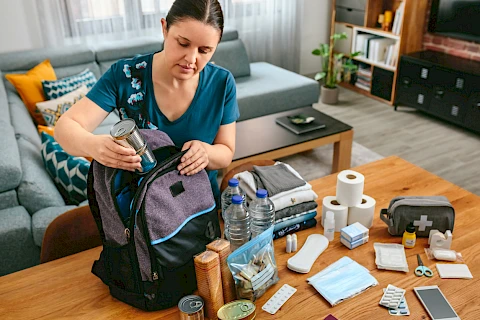
Emergencies can strike at any time, and seniors are often among the most vulnerable when they do. Whether it's a natural disaster or a power outage, having an emergency preparedness plan for seniors can make all the difference. With appropriate preparations, seniors and their caregivers can respond quickly and efficiently, ensuring they stay safe during an emergency.
Assessing Risks and Needs
Identify the types of emergencies most likely to occur in your area. These might include earthquakes, wildfires, or severe weather. Evaluate the senior's individual health and mobility needs. Some may require assistance with walking or have chronic health conditions needing ongoing attention. Consider any medical equipment and medication requirements when creating a plan if an evacuation is necessary.
Essential Supplies for Seniors
An emergency kit is a must-have when critical situations arise. Every emergency kit must contain non-perishable food and water for at least three days, a flashlight and extra batteries, and a first-aid kit. For medical supplies, make sure to include a week's supply of medications, copies of prescriptions, blood sugar monitoring kits, and other essential medical equipment.
Personal hygiene and comfort items can make a stressful situation more bearable. Pack items like toiletries, extra clothing, and blankets. Use a waterproof container for essential documents, including identification, health insurance information, and contact info for family members, doctors, and pharmacies.
Communication Strategies
Establish a communication plan by deciding who will be the point of contact in different emergency scenarios. Creating an emergency contact list ensures everyone knows who to call. Set up alerts and updates on smartphones or other devices to stay informed about emergencies. Ensure all communication devices are accessible and easy for the senior to use.
Special Considerations for Seniors
Mobility challenges, chronic conditions, and medication needs are key factors to address when preparing seniors for emergencies. Some seniors may rely on walkers, canes, or wheelchairs, making quick evacuations more challenging. Ensure there are accessible transportation options that can accommodate any mobility aids.
Emotional and mental health support is also necessary. Keep comforting items and resources like books or puzzles on hand to manage stress. Ensure your plan includes the needs of pets or service animals as well.
Creating a Support Network
Involve family, friends, and neighbors to create a robust support system. Let them know about the emergency plan and how they can assist. Coordinate with local community resources. Many areas have services specifically designed to help seniors during emergencies, from shelters to meal deliveries.
Printable Checklist for Caregivers
The following checklist covers crucial supplies, contacts, and special considerations to safeguard the well-being of your senior loved one during emergencies.
Essential Supplies:
- Medications (7-day supply)
- First-aid kit
- ID and important documents
- Food and water (3-day supply)
- Flashlight and batteries
Emergency Contacts:
- Family members
- Neighbors
- Healthcare provider
- Emergency services
Communication & Transportation:
- Who will your loved one contact in an emergency?
- Who will provide transportation?
Special Considerations:
- Mobility aids (walker, cane, etc.)
- Medical equipment (backup batteries, chargers)
- Comfort items (blanket, photos, etc.)
Experience Exceptional Senior Home Care and Support at Senior Helpers
If you’re considering additional senior support at home to give you more time to craft an emergency preparedness plan for your senior loved one, Senior Helpers Salem, OR, can help. Serving Albany, Salem, Dallas, and Keizer, we can assist with various aspects of elderly care, from companionship to personal care. Contact us for more information!